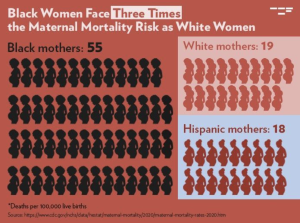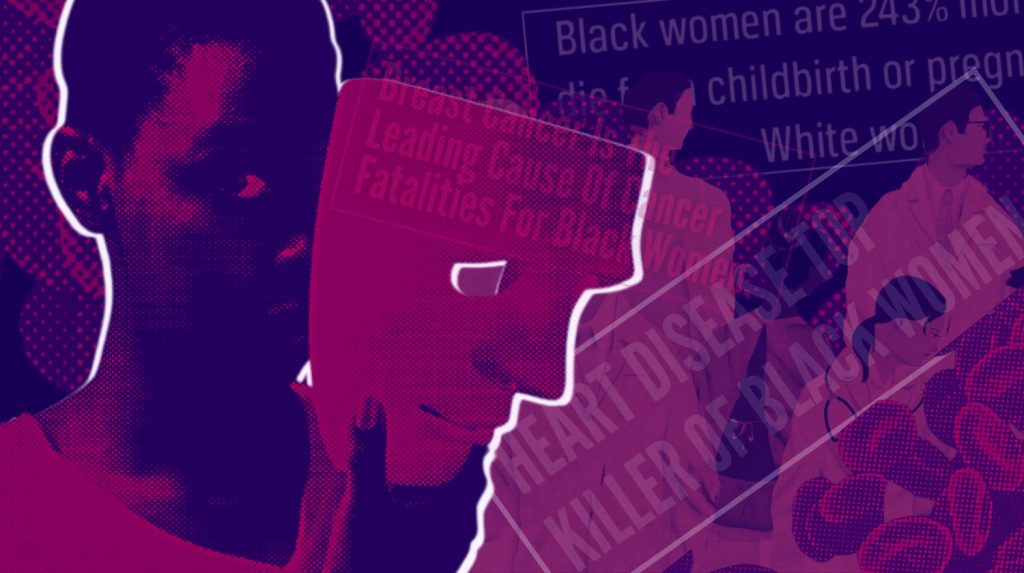By Gwen McKinneyMeet our silent killers. They lurk. They creep. Like assailants in the dark, they can quickly swoop down and consume us in a deadly clutch. They are sinister and sometimes strike without warning. For Black women, they exact incalculable harm to our bodies, our families and our life chances.Black Health ResourcesThe most far-reaching silent killer across generations, geography and economic status is racism and inequality that denies us access, opportunity and a fair chance. Their first cousin is bias – sometimes intentional but often implicit – reflected in cues and missteps of health care providers, baked into the very medical system that should save us.
For Tara Robinson that outright bias doomed her to one hellish week in which she suffered three heart attacks over three days. Sent home twice and repeatedly dismissed, she said the third coronary crisis sent her to heaven and back.
“I had actually gone into sudden death,” remembers Robinson, then a 40-year old Houston school counselor.
Ten years later, Robinson, the founder of the Black Heart Association (BHA), insists Black women’s safety net is being seen and heard. The BHA mission: To eliminate heart-health disparity in the Black community through advocacy, education and empowerment.
Heart disease and stroke are the leading killer of Black people. According to the American Heart Association, black women have almost twice the risk of stroke than their white counterparts and are more likely to die at an earlier age than women of other ethnic groups.
Alarming data estimates that half Black women age 20 and older will have heart disease, but more than one-third of them are unaware of the signs or risk factors.
Silence is a killer, especially when held within. So says Tanja Thompson, a two-time breast cancer survivor and the founder of Breast Cancer Move Foundation. The Air Force veteran and motivational speaker says her second stint with breast cancer five years after her initial diagnosis convinced her that activism was her lifeline.
“There are other women who look like me who are going through this kind of ordeal,” Thompson recalls. “I realized I could no longer hide in silence. I could no longer hide in fear.”
Breast cancer is the leading cause of cancer fatalities for Black women, with colorectal and cervical cancer vying for second and third place, respectively. Black women are struck younger, diagnosed later, die quicker and suffer the most virulent forms. Black women under 35 experience twice the rate of White women, with 39 percent higher recurrence and 71% higher risk of death.
Endometriosis, another deadly affliction for Black women, is deemed a “silent epidemic globally” by the World Health Organization (WHO). Affecting an estimated 10 percent of reproductive age women worldwide, African American women, notably affected with disproportionate death rates, often have late diagnosis or the condition is misdiagnosed as fibroid tumors. According to WHO, a staggering 90 percent of women with endometriosis report being dismissed or disbelieved by healthcare professionals.
 Maternal mortality is another fatal but preventable condition at crisis proportions for Black women who are not seen, heard or cared for. The astronomical rate of maternal mortality affecting African Americans contributes to this country’s status as the worst place to give birth among high-income nations.
Maternal mortality is another fatal but preventable condition at crisis proportions for Black women who are not seen, heard or cared for. The astronomical rate of maternal mortality affecting African Americans contributes to this country’s status as the worst place to give birth among high-income nations.
In Maryland, Johns Hopkins Center for Communication Programs reports Black women are four times more likely to experience a pregnancy-related death than White women. This disparity persists even when controlling for education, body mass index and socio-economic status.
Diabetes and Kidney Disease are also pernicious silent killers that disproportionately strike Black people. In fact, diabetes triggered end-stage renal disease is nearly three times more prevalent in African Americans.
Bernadine Watson, author of a newly-released book Transplant: A Memoir, shares her nearly 40-year journey with kidney disease that included two transplants and two lingering encounters with dialysis. Hers is a story of blood, tears and triumph. But during most of her illness, Watson suffered in silence, keeping her kidney disease a secret even from her family.
Like most survivors in this story, Watson is a striver who forged a transformational path to life and living by confronting her illness free of shame, silence or submission. Always wanting to write a book, at 70 she did it, sharing her story with the world.
“Don’t wait until you’re on dialysis or your kidneys are failing,” advises Watson. She urges that during your annual physical, insist that your kidney functions be checked.
Her parting shot: “Develop a spiritual practice and talk to yourself about how you want to live – sick or healthy.”
Tara Robinson, of the Black Heart Association, is a thriver who transformed adversity into activism and illness into empowerment. She issued a clarion call to action. “Dear Black women, find balance in your lives. Know your stressor. Know your triggers. And take time to breathe.”
Gwen McKinney is creator of Unerased | Black Women Speak.





